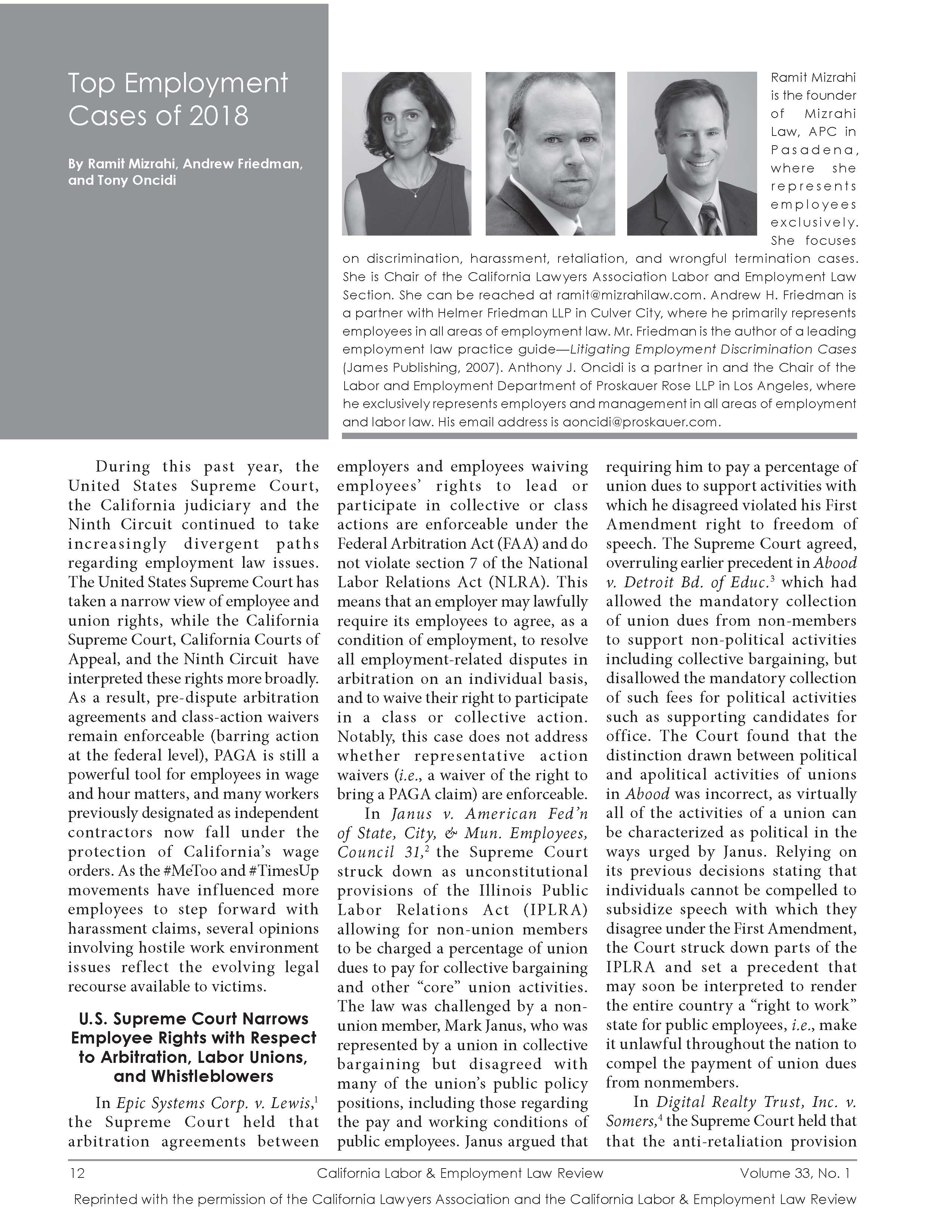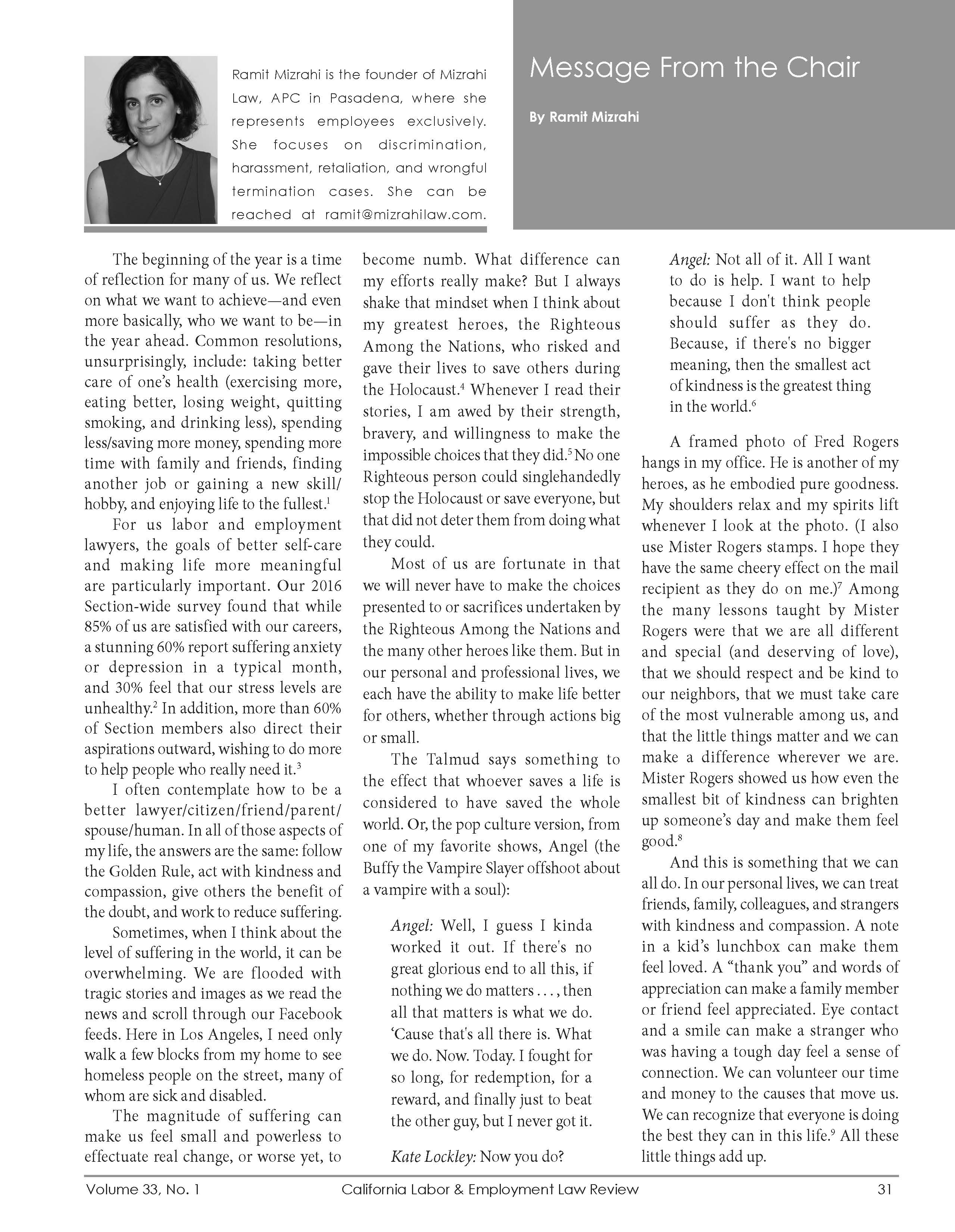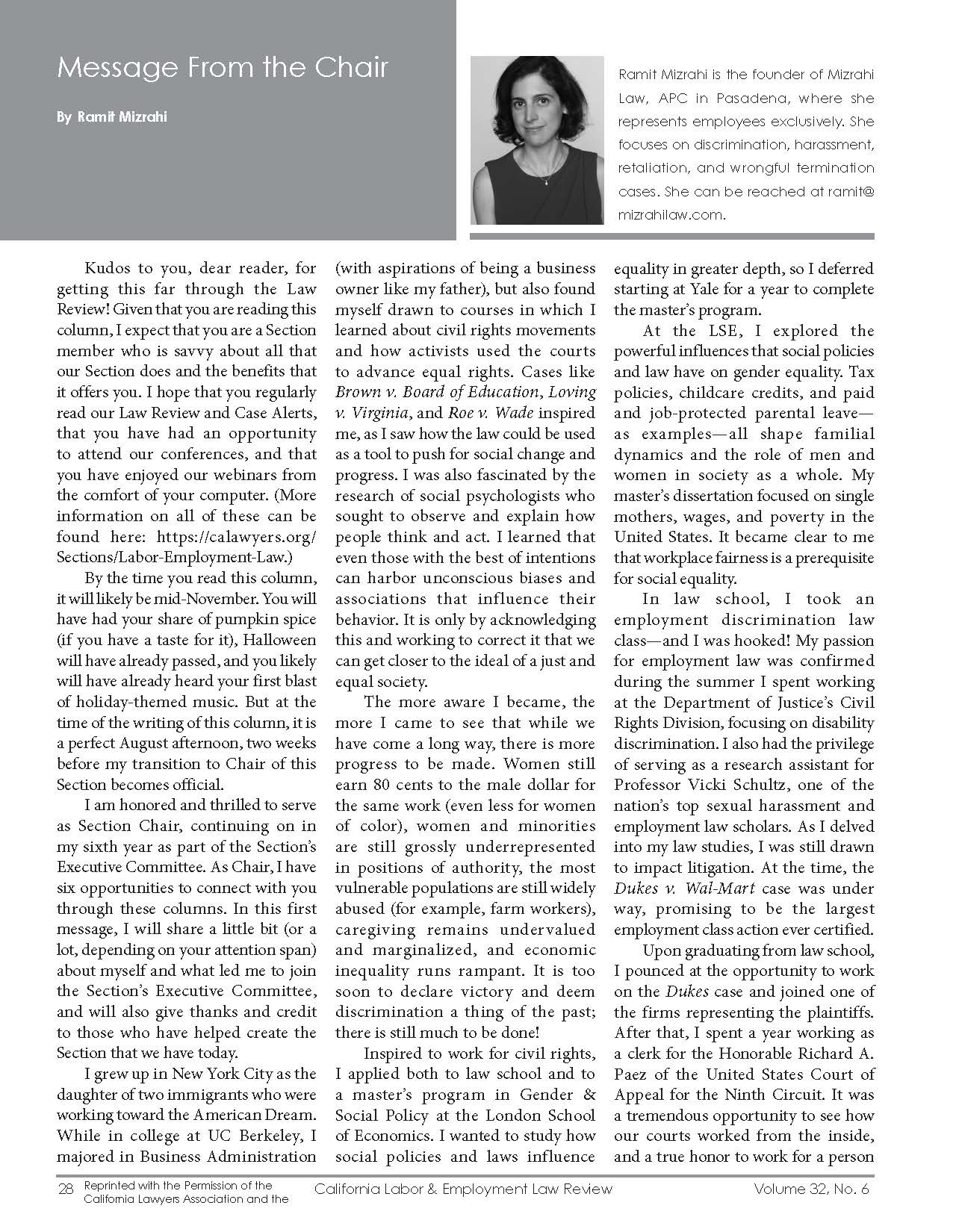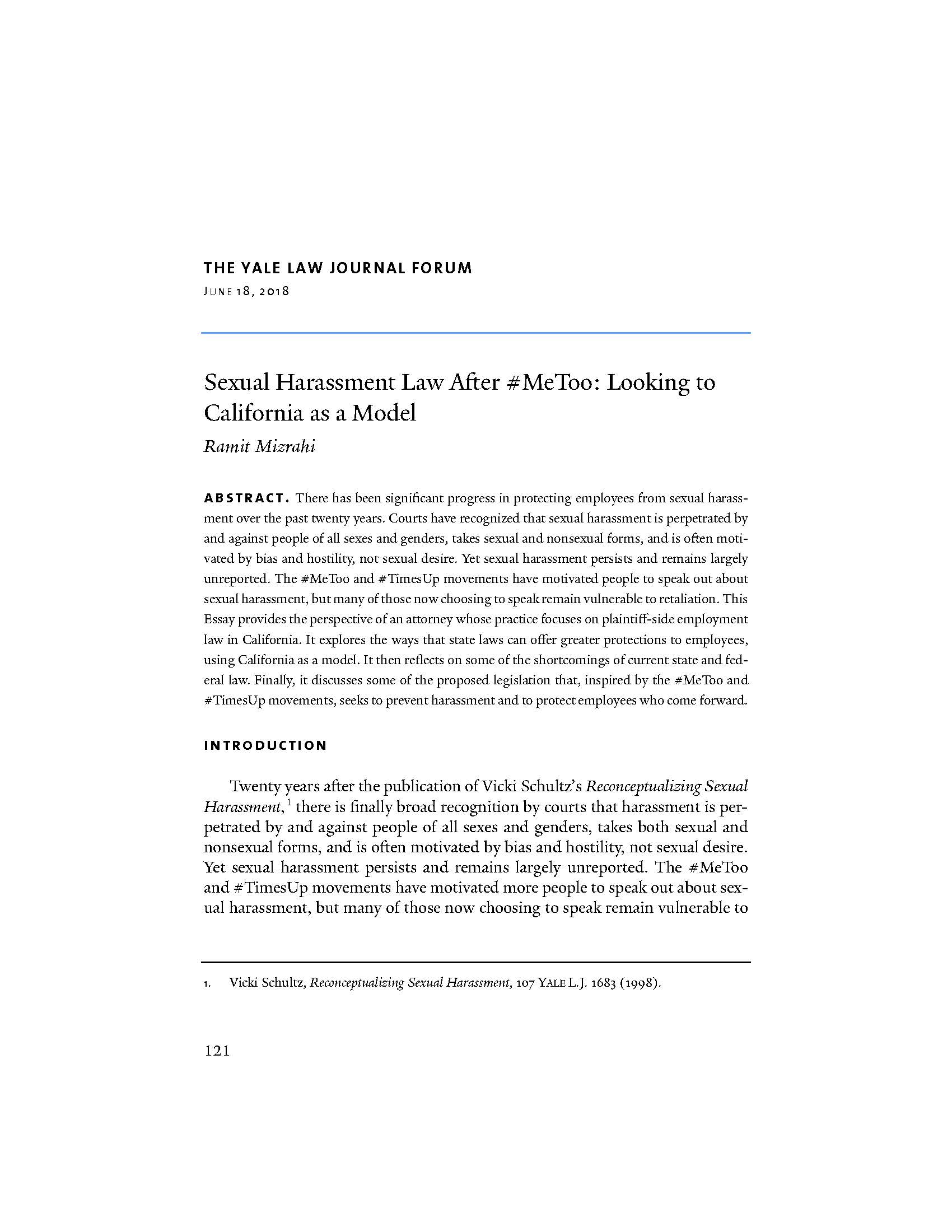-

On February 7, 2019, Ramit Mizrahi will be presenting at the California Lawyers Association’s Employment Law 101 Conference. The conference is designed to teach fundamentals to lawyers new to employment law. She will be presenting on the leaves of absence compliance panel (10:15-11:45 a.m.).
Date and time: February 7, 2019, 8:30 a.m. – 4:45 p.m.
Location: Southwestern Law School, 3050 Wilshire Blvd., Los Angeles, CA 90010
Additional information can be found on the CLA website, here: https://calawyers.org/Sections/Labor-Employment-Law/Education/Employment-Law-101
-
The January 2019 issue of the California Lawyers Association’s Labor & Employment Law Review features an article authored by Ramit Mizrahi, Andrew Friedman, and Tony Oncidi.
The article—”The Top Employment Cases of 2018″—highlights the most important California state and federal employment cases from last year. Click on the below image to read the article in full.
-
The January 2019 issue of the California Lawyers Association’s Labor & Employment Law Review featured Ramit Mizrahi’s second message as Chair of the Labor and Employment Law Section.
Ramit used the column as an opportunity to reflect on her heroes and goals for 2019. Click on the below image to read the article in full.
-
The November 2018 issue of the California Lawyers Association’s Labor & Employment Law Review featured Ramit Mizrahi’s first message as Chair of the Labor and Employment Law Section.
Ramit used the column as an opportunity to introduce herself to Section members and to speak about what the Section has to offer. Click on the below image to read the article in full.
-

On November 8, 2018, Ramit Mizrahi will once again be speaking about the year’s most important employment law cases. The panel will be part of the Employment Round Table of Southern California’s 2018 Annual Conference & Awards Luncheon. She will be speaking alongside Irma Rodriguez Moisa, of Atkinson, Andelson, Loya, Ruud & Romo.
Date and time: November 8, 2018, 8:45 a.m.–10:15 a.m.
Location: Millennium Biltmore, Los Angeles, CA
Additional information can be found on the ERTSC event page.
Just last month, Ms. Mizrahi presented the on the top 50 employment cases of 2018 at the California Employment Lawyers Association’s 31st Annual Employment Law Conference, alongside Andrew H. Friedman of Helmer Friedman, LLP. The presentation was made at a plenary session to the conference’s approximately 400 attendees.
-
03 Oct '18
Acting on the momentum of the #MeToo and #TimesUp movements, California legislators have leapt into action, putting forward legislation to protect employees who have been subjected to or opposed sexual harassment. They sought to limit confidentiality and nondisparagement provisions, restrict mandatory arbitration, increase recordkeeping and training obligations, extend the statute of limitations, and create individual liability for retaliation. In June, I wrote about the importance and potential impact of these bills in Sexual Harassment Law After #MeToo: Looking to California as a Model, published in the Yale Law Journal Forum.
On September 30, 2018, Governor Brown signed into law a number of the bills aimed at addressing sexual harassment and abuse. He vetoed several others, to the disappointment of employee rights advocates. Overall, however, the new laws are cause for celebration.
Bills Signed into Law
SB 820, The Stand Together Against Non-Disclosures (STAND) Act
SB 820 prohibits confidentiality provisions in the settlement agreement of any civil or administrative action that states a cause of action for: sexual assault; workplace harassment or discrimination based on sex; failure to prevent workplace harassment or discrimination based on sex; sexual harassment in a business, service, or professional relationship; and sex discrimination, harassment, or retaliation by the owner of a housing accommodation. The law permits restrictions on disclosure of the settlement amount. An employee is entitled to request confidentiality. The STAND Act will make it more difficult for employers to support and protect serial harassers.
AB 3109
AB 3109 makes a provision in a contract or settlement agreement void and unenforceable if it waives a party’s right to testify in an administrative, legislative, or judicial proceeding concerning alleged criminal conduct or sexual harassment.
SB 1300
SB 1300 is a comprehensive bill that helps combat sexual harassment in a number of ways. Among other things, it:
- Prohibits nondisparagement agreements that gag employees from disclosing information about sexual harassment and other unlawful acts (often presented to employees at the outset of their employment as a condition of employment);
- Prohibits releases of claims presented in exchange for a raise, bonus, or as a condition of continued employment;
- Holds employers liable for failing to prevent all forms of unlawful harassment by third parties, not just sexual harassment;
- Confirms that prevailing defendants are entitled to fees and costs only when the action is frivolous, notwithstanding CCP section 998. This means that an employee need not fear that if she loses her case, that she may be forced to pay the company’s legal costs;
- Declares legislative intent regarding sex harassment, including that a single incident can constitute sex harassment, even absent extreme circumstances, that an employee’s work performance need not have suffered, and that summary judgment should rarely be granted;
- Makes sexual harassment training more robust.
AB 1619
AB 1619 increases the statute of limitations for civil action for sexual assault of an adult to
-
Less than a month before the movie “The Predator” was released, actress Olivia Munn learned that fellow actor Steven Wilder Striegel was a registered sex offender. She reported the information to the studio, and in response the studio pulled the scenes involving the actor. But, it turns out that The Predator’s director Shane Black was friends with Striegel and knew of his status as a registered sex offender before casting him in the movie. He never told Munn or anyone else involved in the production. And while the scene was cut, Munn has felt ostracism from her peers since she made her report.
This situation raises interesting questions about employers’ obligations to protect other employees and prevent sexual harassment. Below, I discuss some of the key laws that apply.
The Fair Employment and Housing Act Creates a Duty to Prevent Workplace Harassment
The California Fair Employment and Housing Act (FEHA), Government Code § 12940, prohibits workplace sexual harassment and other forms of harassment and discrimination based on protected categories. An employer is strictly liable for sexual harassment by a supervisor. It is also liable for harassment by coworkers, subordinates, and even nonemployees if it knew or should have known of the harassment and failed to take immediate and appropriate corrective action. An employer is also separately liable for failing to take all reasonable steps necessary to prevent discrimination and harassment from occurring.
This means that an employer faces significant exposure under the FEHA if it knowingly employs a sexual harasser or sex offender and fails to take actions to protect its other employees from sexual harassment by that person.
Megan’s Law Establishes a Sex Offender Registry, But Limits the Use of Such Information in Employment To Protecting Persons at Risk
California’s Megan’s Law, Penal Code § 290.46, requires the California Department of Justice to maintain a website that identifies individuals convicted of specific sex offenses. The Megan’s Law Website includes the following information about the sex offenders listed in the registry: their name and known aliases, a photograph, a physical description, including gender and race, date of birth, criminal history, prior adjudication as a sexually violent predator, the address at which the person resides, and any other information that the Department of Justice deems relevant. Crimes that trigger a listing in the registry include: rape, sexual battery, sexual trafficking of minors, and sex crimes involving children. Certain sex offenders may apply to have their information removed from the website…
-

Ramit Mizrahi has been recognized in U.S News & World Report’s 2019 Edition of The Best Lawyers in America© for her work in employment law representing individuals.
Ms. Mizrahi has also been selected to the 2019 Southern California Super Lawyers® list, again for her work in employment law representing individuals.
Both honors reflect peer recognition of excellence in practice.
This marks the seventh year that Ms. Mizrahi has been recognized by Super Lawyers®, including having previously been distinguished as being among the top 100 Rising Stars and top 50 Rising Stars women for three consecutive years.
Ms. Mizrahi remains committed to serving as a tenacious advocate for her clients while working to build collegiality and community in the legal profession.
-
On June 18, 2018, Ramit Mizrahi’s essay, Sexual Harassment Law After #MeToo: Looking to California as a Model, was published in the Yale Law Journal Forum. The essay is part of a Collection by the Yale Law Journal and the Stanford Law Journal on #MeToo and the Future of Sexual Harassment Law. Ms. Mizrahi’s essay is the only one in the Collection that gives the perspective of a practicing lawyer and is not written by a legal scholar.
Drawing from her extensive experience representing employees in sexual harassment cases, Ms. Mizrahi discusses the evolution of the law, including the impact of the #MeToo and #TimesUp movements, current shortcomings, and proposed legislation in California that would help prevent harassment and protect employees who come forward. This is Ms. Mizrahi’s second piece on sexual harassment law that the Yale Law Journal has published. The first was “Hostility to the Presence of Women”: Why Women Undermine Each Other in the Workplace and the Consequences for Title VII, Note, 113 Yale L.J. 1579 (2004).
The essay
Sexual Harassment Law After #MeToo: Looking to California as a Model can be found here. You can also click on the below image for the link to the pdf version: -

On April 12, 2018, Ramit Mizrahi will be moderating a panel at the California Lawyers Association’s 35th Annual Labor and Employment Law Conference. Here are the panel details:
Naughty Clients, Ethical Lawyers (What To Do When Your Client Does Something Bad)
(1.25 HOURS LEGAL ETHICS)Description: Practice law long enough and you will inevitably find yourself wondering how to deal with sticky situations that are created, intentionally or inadvertently, by your clients. In this engaging panel, we will discuss some difficult situations that come up and how to best deal with them, including discovering that clients: took documents that they may not be entitled to possess, deleted documents that should have been retained, did not disclose key facts to counsel, made misrepresentations, recorded conversations without consent, made possibly extortionate statements, and engaged in other behaviors that lawyers would consider as “crossing the line.”
Date and time: April 12, 2018, 12:45 p.m.– 2:00 p.m.
Location: JW Marriott Union Square, 515 Mason St., San Francisco, CA.
Additional information can be found on the Labor & Employment Law Annual Meeting and Public Sector Conference page.
Mizrahi Law Blog
Mizrahi Law, APC
- 35 N Lake Ave, Ste 710, Pasadena, California 91101
- contact@mizrahilaw.com
- (626) 380-9000
Client Testimonial
“I highly recommend Ramit Mizrahi. She has a winning combination of knowledge, passion, strategy, and empathy. She takes action and communicates updates promptly. Her professionalism is hard to beat. I’d give her 10 stars if I could!”
Latest News
- Ramit Mizrahi has been recognized as one of the Top 100 Super Lawyers and Top 50 Women Super Lawyers in Southern California in 2023.
- Ms. Mizrahi is being recognized in the 2023 Edition of The Best Lawyers in America©, published by U.S. News & World Report and by Best Lawyers.
- Ms. Mizrahi has been selected as a Top Attorney by Pasadena Magazine for 2023.
- Ms. Mizrahi is serving as Chair of the Pasadena Bar Association Labor and Employment Section.






